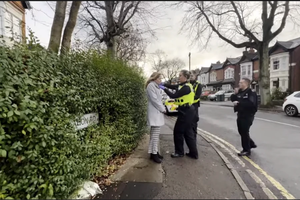The Government Cannot Dictate Your Conscience
COMMENTARY: Government restrictions on conscience protection should be opposed by all in a free society.

“What do you think is best for me, Doctor?”
This question has been asked numerous times by too many patients to count. Inescapably, the doctor’s conscience will inform how he or she answers this question.
The new administration intends to overturn religious conscience protections by mandating contraceptive coverage and abortion services. These policies intend to certify elective procedures, such as abortion and contraception, as essential women’s health care and a human right. These changes target religious organizations, such as the Little Sisters of the Poor, and individuals with sincerely held religious beliefs counter to the current administration’s reproductive rights agenda. According to the administration, those who are perceived as imposing religious or moral beliefs on patients, potentially damaging a patient’s health, or basing their worldviews on grounds other than so-called scientific information should no longer have the right to exercise their freedom of conscience.
Government restrictions on conscience protection should be opposed by all in a free society. These new regulations violate the Religious Freedom Restoration Act and the First Amendment. But why are conscience protections so important to all? What exactly do we mean by the word “conscience”?
Conscience is an individual’s determination of whether or not an action is good or bad. These actions can affect the individual or others. According to the Catechism, conscience has a “rational foundation and can be explained to others” (1778). For Catholics, it is important that one’s conscience be conformed to the truth. It is imperative that one should form one’s conscience well, understanding the truths of the faith outlined by the magisterium in Scripture and Tradition. Developing a well-formed conscience is so important because our actions do play a part in our eternal salvation or damnation. However, it is important to note that culture, religion, personal experience, as well as subjective and objective data all play a part in forming one’s conscience. The virtue of prudence plays a pivotal role in forming one’s conscience, since it is the ability to govern and discipline oneself by the use of reason. Understanding this, we can agree with atheists and other non-Catholics that both reason and science should play a part in forming a healthcare practitioner’s conscience. A well-formed conscience allows one to act with integrity and moral character.
Appealing to conscience, however, does not guarantee consensus. We see this clearly today with the unending debates over morality. What is right for one might not be seen as good by another. In the end, it is the individual practitioners who determine the proper action, according to their conscience, and they should be able to act accordingly, within due limits, broad as they should be.
We should protect conscience rights for all, not just those of faith, to avoid authoritarian dictates on medical services provided. We must do so to preserve the moral integrity of medicine.
The current administration seeks to impose an “administrative conscience” on health care, which would supersede and destroy individual conscience rights. Ironically, the administration will destroy individual freedom by establishing artificial rights to abortion and contraceptive services. These new regulations will undermine individual liberty by granting politicians and special interest groups the right to decide what is good and evil, and in healthcare, what is deemed best for the patient.
The goal of medicine is to “do no harm” and to seek the best methods of care as determined by the doctor and the patient. Healthcare is about relationships, not transactions. Patients seek providers whom they trust, respect, and with whom they share common beliefs. At the core of the doctor-patient relationship is the essential trust to do what is right to promote the patient’s physical and spiritual well-being. You cannot remove moral agency from this interaction. Determining the best treatment requires providers have a well-formed conscience that has been influenced over many years by their interpretation of objective scientific data, patient experience and values, patient care, personal convictions, and sometimes, religious faith. This conscience cannot be dictated by the government; instead, it must remain with the individual.
Otherwise, who will answer the question, “What do you think is best for me, doctor?”
Michael S. Parker, MD, is the president of the Catholic Medical Association.
This article is the first in a series.
- Keywords:
- conscience protection
- government
- biden administration
- religious freedom restoration act
- catholic medical assocation













